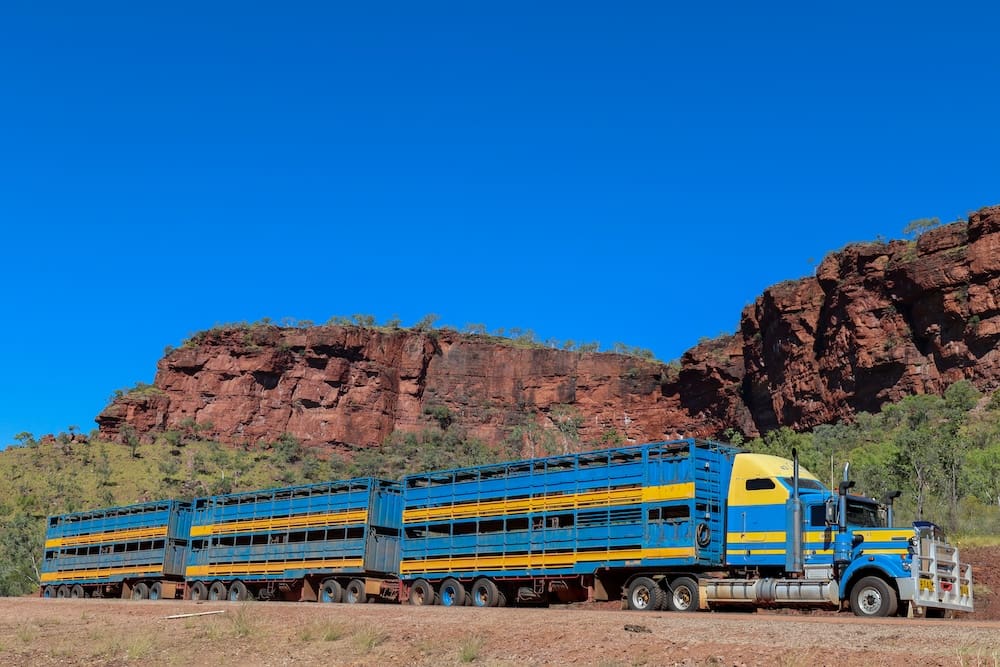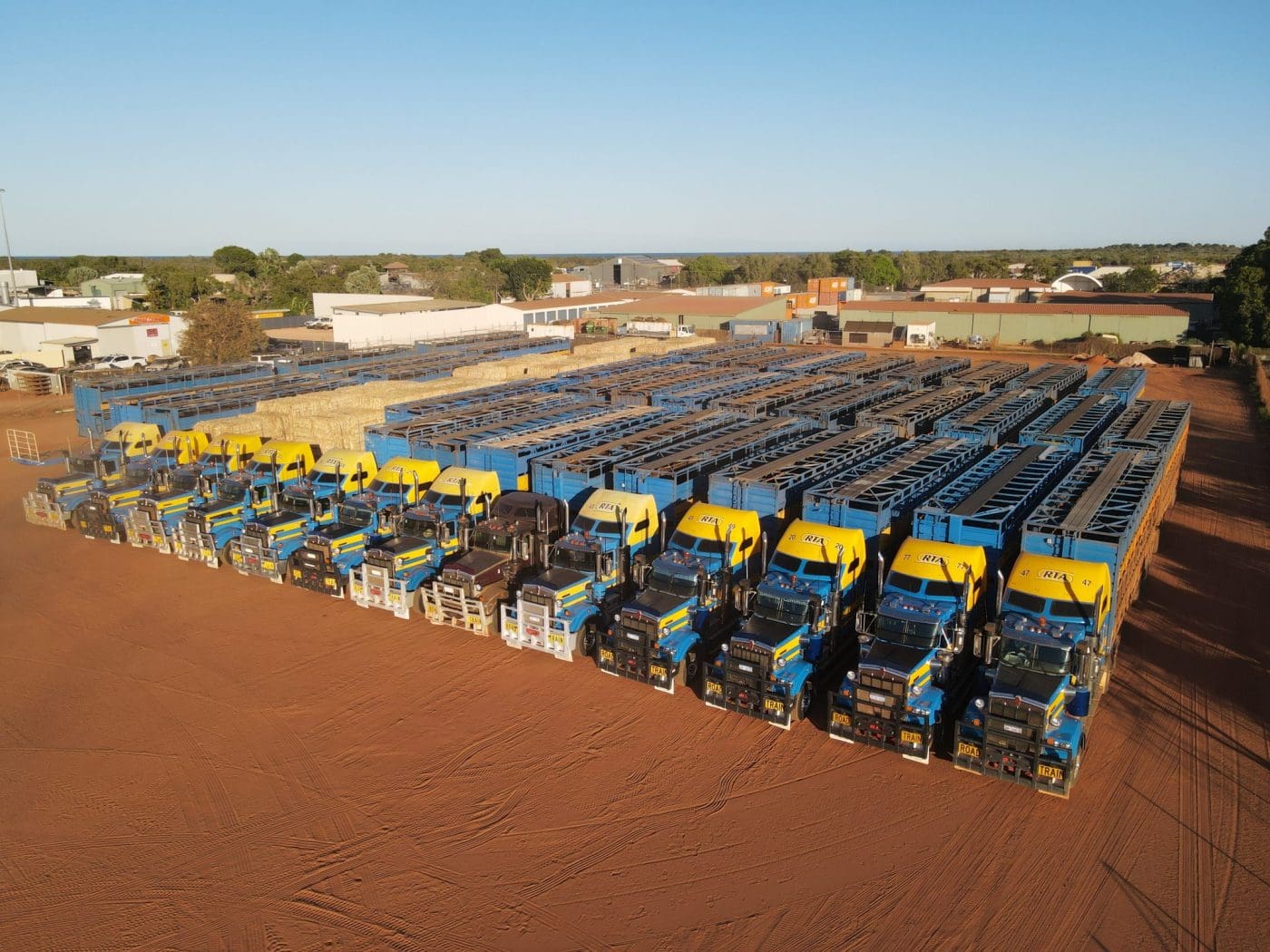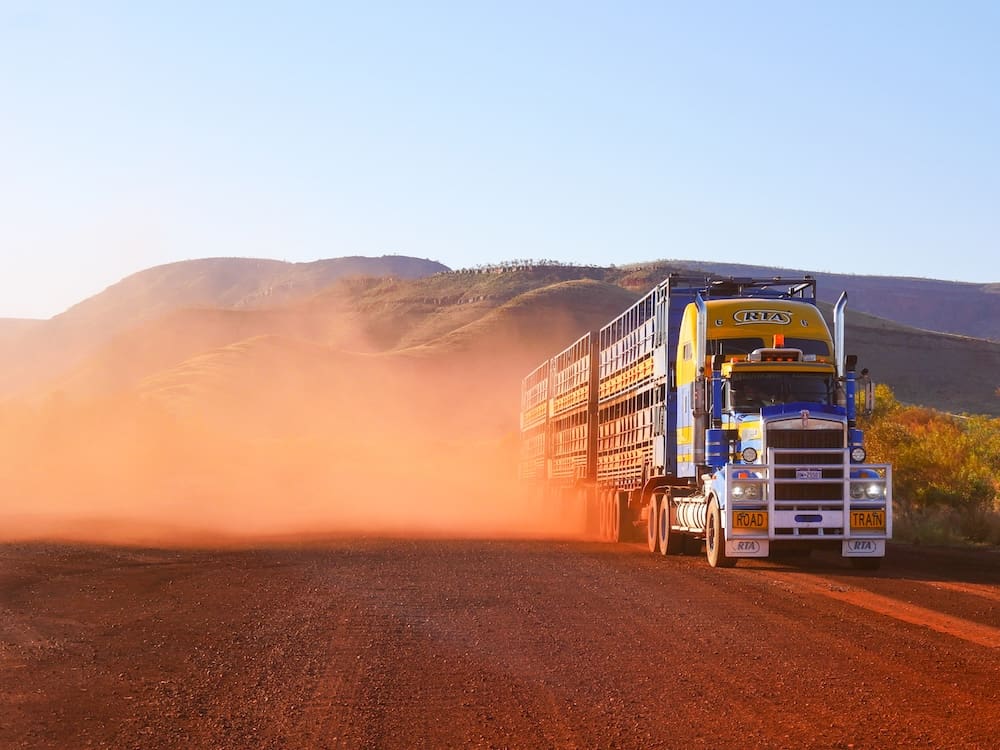The story of Road Trains of Australia is in many ways the story of how the pastoral potential of the modern northern Australian cattle industry was unlocked.
The company’s DNA is intertwined with the innovative pioneers who through bush ingenuity, resilience and camaraderie overcame seemingly insurmountable barriers to transform remote livestock transport and literally pave the way for the growth of the northern Australian cattle industry as it exists today.
 RTA’s operations today cover the entire northern half of the continent, with the company’s 70 odd road trains averaging between 145,000 to 170,000km per year, much of which is travelled in billowing clouds of bulldust on unsealed roads.
RTA’s operations today cover the entire northern half of the continent, with the company’s 70 odd road trains averaging between 145,000 to 170,000km per year, much of which is travelled in billowing clouds of bulldust on unsealed roads.
With northern cattle transporting work centred heavily on the seasonal and at times unpredictable northern shipping trade to South East Asia, RTA has diversified into other transport sectors in recent years.
Its overall fleet now comprises approximately 130 Kenworth and Mack prime movers, with approximately 60 not utilised for livestock transport engaged in the mining sector in addition to hauling fuel, grain, bulk feed, hay and cotton and cotton seed across all points of northern Australia.
Taking shape
RTA as it is today took shape in July 2006, when Dave Jones—then leading Hampton Transport Services’ (HTS) cattle operations in northern WA and the NT—sat down with RTA owner Jim Cooper. The two were fierce competitors on overlapping freight routes, often running with empty backloads. It became clear: one would have to buy the other out.
Rather than continue competing, a joint venture was formed. Dave and his brother Bart, alongside their father Bart “Boss” Jones and HTS directors, negotiated to merge HTS’s cattle arm with RTA under the temporary name Hampton RTA Pty Ltd. When Jim Cooper’s original RTA entity released its name, the joint venture was renamed Road Trains of Australia Pty Ltd.
 In 2007, RTA acquired Hansen Livestock Transport, extending its network with depots in Longreach and Quilpie, while several years ago the acquisition of Barkly Transport added to RTA’s high horsepower livestock transporting stable.
In 2007, RTA acquired Hansen Livestock Transport, extending its network with depots in Longreach and Quilpie, while several years ago the acquisition of Barkly Transport added to RTA’s high horsepower livestock transporting stable.
Today, RTA’s 200 plus livestock trailers, almost all of which operate in triple road train configurations, travel across some of the roughest terrain in Australia.
With its own extensive depots and workshops dotted across the country including Geraldton and Broome in WA (soon to include Port Hedland); Noonamah and Katherine in the NT and Mount Isa, Cloncurry and Longreach in Qld, RTA maintains all of its own vehicles and repairs, rebuilds and refabricates its livestock crates in-house.
In addition to delivering cattle to northern live export ports, RTA’s livestock transport work also involves a lot of station to station transfers for large pastoral clients in addition to carting northern cattle to feedlots and B-Double work to feedlots and abattoirs in southern Australia.
A driving force for innovation
RTA is a living part of Australia’s pastoral history but also a driving force for technology uptake and innovation in the northern cattle industry.
Satellite technology is used to precisely track all trucks in real time while the company has developed its own app for bookings, driver work diaries, fatigue and prestart checks.
Forward, side and driver facing cameras operate in every vehicle for safety reasons, while Starlink devices are steadly replacing satellite phones for enhanced communication in all areas.
Biodiesel from beef tallow trial
Another area where RTA is at the forefront of innovation is through a ground-breaking trial due to commence soon in partnership with the CSIRO and EnviroAg.
Through the trial RTA will test the use of biodiesel created from beef tallow to reduce the reliance on conventional diesel in some of its prime movers.
The program requires no conversion of their existing fleet and has range of potentially significant implications in terms of livestock sector efficiency, future fuel security and industry emissions and carbon footprint.
Two legacies, one iconic brand
RTA as it is known today is a legacy of two prominent companies that helped to pioneer modern livestock transport in some of Australia’s most remote and hard-to-access landscapes.
Hampton Transport Services (HTS) was founded in 1977 by Bart “Boss” Jones and his brothers at Hampton Hill Station near Kalgoorlie during a drought. The company’s first truck—a Scania 111 painted in the blue and yellow colours of Sweden where the brand originates —became an iconic fixture. HTS expanded steadily under Boss and sons Bart (focused on mining and bulk haulage) and Dave (livestock).
Dave spearheaded HTS’s growth into northern WA and the NT, acquiring Broome-based Butler Transport in 1991, establishing depots in Broome and Berrimah, and eventually relocating to Noonamah, where they operated an accredited export yard. Later acquisitions included Groves Livestock Transport in 2001.
Boss Jones passed away in 2006, the same year HTS merged with RTA. He was posthumously inducted into the National Road Transport Hall of Fame in 2011 for his pioneering use of communications and tracking tech in the industry.
RTA’s roots also reach back to legendary cattle carrier Noel Buntine, who pioneered long-haul livestock transport across northern Australia in the 1950s and 60s. Starting with copper ore and freight in Alice Springs, Noel Buntine shifted to cattle transport after negotiating contracts with Victoria River District stations in 1960.
His company, Buntine Roadways, grew with the development of beef roads and changes like the BTEC eradication program. By the 1980s, Buntine Roadways had become the largest road train operator in the Southern Hemisphere.
After selling the business in 1981, Noel Buntine later repurchased it and renamed it Road Trains of Australia, starting over with just two trucks and quickly rebuilding the fleet. He sold RTA again in 1985 to Dick David and Ken Warriner. The business was bought by Jim Cooper and Mick Flynn of Flynn Petroleum in 1993, before Mr Cooper bought out Mick Flynn to take full ownership in 1995.
Following Noel Buntine’s sudden death in 1994, the Buntine Highway was named in his honour, commemorating his outsized impact on the development of the northern cattle transport industry.
HEAD OFFICE – MUCHEA
3363 Great Northern Highway / PO Box 347 – Muchea WA 6501
Phone: (08) 6380 6400
BROOME
Glenn Smith – Mobile: 0429 515 636
Lot 5 Port Drive / PO Box 2132 – Broome WA 6725
Phone: (08) 9192 6188
Email: glenn@rta.net.au
DARWIN / KATHERINE
Cnr Stuart Highway & Elizabeth Valley Road
PO Box 354 – Noonamah NT 0837
Nick Vereker – Mobile: 0447 748 735
Phone: (08) 8978 4300
Email: nick.vereker@rta.net.au
MOUNT ISA
Mike Bailey – Mobile: 0428 989 434
150 Old Mica Creek Road / PO Box 2081 – Mount Isa QLD 4825
Phone: (07) 4743 2500
Email: mike@rta.net.au
LONGREACH
Leo Ballantine – Mobile: 0427 973 212
10 Happyjack Court / PO Box 536 – Longreach QLD 4730
Phone: (07) 4658 1145
Email: leo.ballantine@rta.net.au





Yes I spent time with RTA my son James Jandles drove the Rigs as well great part of my life I enjoyed it keep the great work up I have a few photos in my collection keep the good work regsrds Rod Rocket from the wildness..